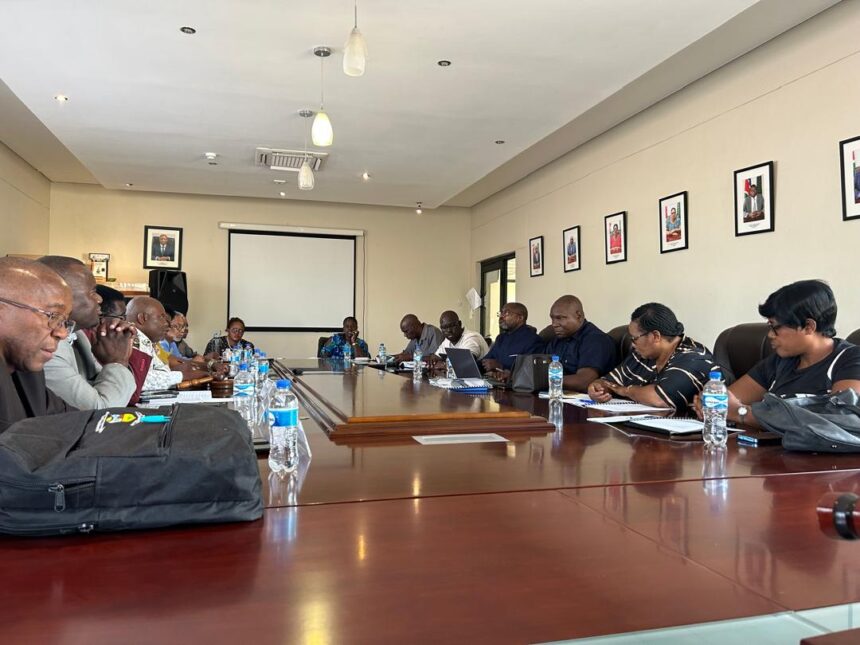KATIMA MULILO – In order to ease the burden on its books and revitalise service delivery at the town, the Katima Mulilo Town Council has asked the Namibia Revenue Agency (NamRa) to waive penalties and interests exceeding N$82 million.
The town council wants this to be done through the agency’s tax incentive programme, which the town’s chief executive officer Rafael Liswaniso believes will significantly improve their fiscal stability and translate into enhanced service delivery to the residents.
The penalties and interests date back as far as 2019, which also saw the town receiving an adverse audit opinion from the Auditor-General as their books and records were in a poor state making it impossible for the Auditor-General to express an opinion.
During a recent hearing with the parliamentary standing committee on public accounts and economy, Liswaniso admitted that the town council had over the years faced a huge backlog and challenges with reconciling its Pay As You Earn (PAYE), which has now been addressed with monthly submissions of PAYE returns.
He explained that the delay in VAT reconciliation was caused by the computer system crash, where no backups were done, forcing a restart of the process.
“However, there is still a substantial outstanding balance of N$ 82,655,770.42, including penalties of N$ 36,209,142.37 and interest of N$ 23,375,366.74, with the principal total debt amounting to N$ 23,071,261.31. We have since entered an MoU with NamRa and have rectified that situation,” Liswaniso explained to the committee.
But committee’s chairperson Peter Kazongominja was not entirely satisfied as the town council had a difference of N$2,73 million between the VAT (value added tax) control account and the submitted returns that could not be verified.
It was then recommended that the town council reconciles the VAT control account to agree with the submitted VAT returns.
Another issue the parliamentary committee raised is bad debts, which the committee said remains a thorny issue and on that needs urgent attention.
Another committee member Leonard Shikulo wanted council to explain why it failed to reconcile its trade receivable balances against the financial statements, and if council have a policy in place to control its debt.
Liswaniso explained that council has a credit management policy in place, approved in 2018 and amended in 2021.
“As per the policy, accounts of more than 90 days overdue are classified as bad debts and subject to legal action. The audited financial statements of 2019 showed trade debtors of N$5,880,788, which was the difference between the total debt value of N$71,112,625 and the total accumulated debt impairment of N$65,231,837,” he maintained.
However, he said council acknowledges that the treatment of the entire debt impairment provision and the total debtors should have been reflected accurately in the financial statements.
Going forward, he assured that council will follow the audit recommendations in treating debt impairment provisions and trade debtors. “This has already been taken care of during the 2020/2021 financial year,” he added.
Shikulo also asked why the council has failed to have a detailed fixed asset register in place, to which Liswaniso said council provided an asset register showing item descriptions, purchase prices, depreciation, and net book values as of 30 June 2019.
However, he said the auditors faced difficulties verifying the existence of the assets due to the lack of marking on the council’s assets, resulting in the absence of a link between the actual assets and the asset register.
To rectify this, he indicated council has acquired tags to ensure that all assets are tagged for easy verification during the audit of their assets and ensure compliance.
Another issue raised is that auditors could not obtain any audit evidence to verify the Build Together loans amounting to N$2,98 million.
“Can council explain to the committee why it failed to provide supporting documents related to Build Together loans to the auditors at the time of audit?” member of parliament Abner Shikongo wanted to know.
Liswaniso defended that due to the absence of a computerised accounting system for the Build Together programme, the auditors were unable to verify the balance of N$ 2,89 million representing the true book value of the loans.
To address this, he said the council committed to scrutinising all payments and contracts of Build Together beneficiaries, ensuring accurate reflection of amounts in future financial statements that can be verified during the audit engagement.
“In the meantime, council has made preliminary investigations and is busy rectifying the query. This has been addressed through the ministry,” he said.
Committee member, Harald Kabrunde asked why council could not provide supporting documents for the sale of ervens amounting to N$2,9 million to auditors timely.
The CEO explained that the trial balance indicates that the council received a total amount of N$2,9 million in land sales, adding that council resolutions and ministerial approvals for the sold erven are available and ready for inspection by the committee.
On trade payables, Liswaniso stressed the breakdown of accounts payables amounting to N$ 29,7 million was provided during the audit. This comprises transactions with Namwater totalling N$28,2 million and other summarised creditors amounting to N$1,5 million.
On equity and investments without share certificates, Liswaniso said supporting documents justifying the investment of N$3,5 million were provided during the audit.
“This amount represents the council’s expenditure on the electrification of ext. 13, and part of Katima Proper (Coloureds Camp), with the infrastructure subsequently taken over by Nored, becoming an investment in Nored Electricity Pty Ltd. However, NORED has, since its inception, never provided local authorities with Katima Mulilo Town included with the share certificates,” he charged.
According to him, NORED has since promised through their meetings with all local authorities to issue share certificates once they have completed the evaluation of shareholder assets.
-anakale@nepc.com.na



